If you’ve been told that your cholesterol levels are high, you’re not alone. In fact, high cholesterol is a common issue, but the good news is that you can take action. A healthy meal plan can help lower cholesterol and improve your heart health. So, let’s dive into a simple, delicious 7-day meal plan that’s specifically designed to lower cholesterol while keeping you satisfied and energized.
What Is Cholesterol and Why Should You Care?
Cholesterol is a type of fat found in your blood. While your body needs cholesterol to build healthy cells, having high levels of it can increase your risk of heart disease. There are two main types of cholesterol: LDL (low-density lipoprotein), often called “bad” cholesterol, and HDL (high-density lipoprotein), known as “good” cholesterol. The goal? Lower LDL and raise HDL.
The good news is that diet plays a significant role in managing cholesterol levels. By focusing on heart-healthy foods, you can make a big difference.
Key Foods to Include in Your 7-Day Meal Plan to Lower Cholesterol
Before we jump into the meal plan itself, let’s take a look at some foods that can help lower cholesterol:
- Overnight Oats and Barley: High in soluble fiber, these grains can help lower LDL cholesterol.
- Nuts: Walnuts, almonds, and other nuts are packed with healthy fats that help lower cholesterol.
- Fatty Fish: Salmon, mackerel, and sardines are rich in omega-3 fatty acids, which are heart-healthy.
- Avocados: Full of monounsaturated fats, avocados help reduce bad cholesterol.
- Olive Oil: A heart-healthy fat that can replace butter or margarine in your cooking.
- Beans and Legumes: High in fiber, they help reduce cholesterol and improve heart health.
- Fruits and Vegetables: Rich in fiber and antioxidants, these help lower cholesterol levels and support overall health
A 7-Day Meal Plan to Lower Cholesterol
Day 1: Start Strong with Fiber-Rich Foods
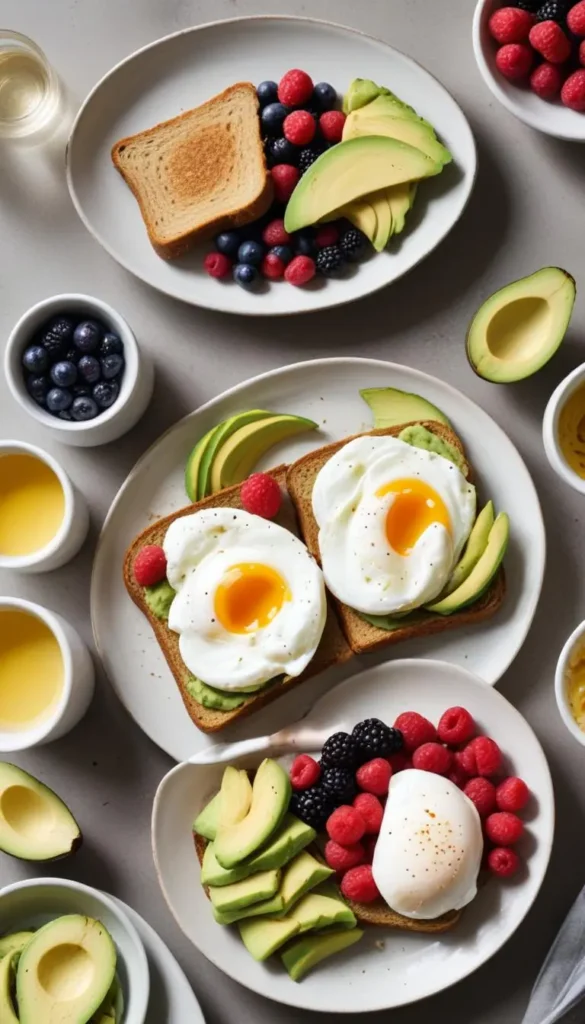
Breakfast:
- Oatmeal with Fresh Berries: Start your day with a warm bowl of oats topped with fresh berries and a sprinkle of chia seeds. This fiber-packed breakfast helps lower cholesterol and provides lasting energy.
- Green Tea: Rich in antioxidants, green tea is a great way to support heart health.
Lunch:
- Grilled Chicken Salad: Toss grilled chicken breast with leafy greens, tomatoes, cucumbers, and a drizzle of olive oil. Add a handful of walnuts for crunch and heart-healthy fats.
- Whole Wheat Bread: Enjoy a slice of whole wheat bread with your salad for added fiber.
Dinner:
- Baked Salmon with Quinoa and Steamed Veggies: Salmon provides healthy omega-3 fats, while quinoa adds protein and fiber. Pair it with steamed broccoli and carrots for a nutrient-packed meal.
Snack:
- A small handful of almonds or walnuts.
Day 2: Focus on Healthy Fats
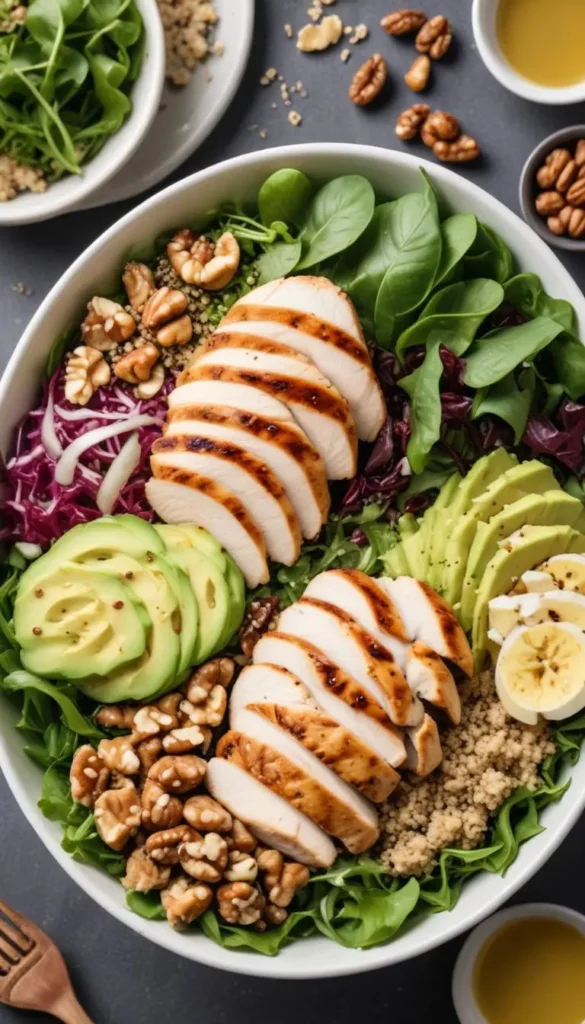
Breakfast:
- Avocado Toast: Spread mashed avocado on whole wheat toast. Top with a poached egg for extra protein.
- Orange Juice: Fresh-squeezed orange juice gives you a burst of vitamin C.
Lunch:
- Lentil Soup: A hearty bowl of lentil soup with vegetables. Lentils are a great source of fiber, which helps manage cholesterol levels.
- Side Salad: A side of mixed greens with olive oil and vinegar dressing.
Dinner:
- Grilled Chicken with Sweet Potato and Steamed Asparagus: Sweet potatoes are rich in fiber and vitamins, making them a great choice for a cholesterol-lowering dinner.
- Olive Oil Drizzle: Use olive oil to sauté the asparagus for added healthy fats.
Snack:
- A small serving of Greek yogurt with a few walnuts.
Day 3: Emphasize Plant-Based Meals
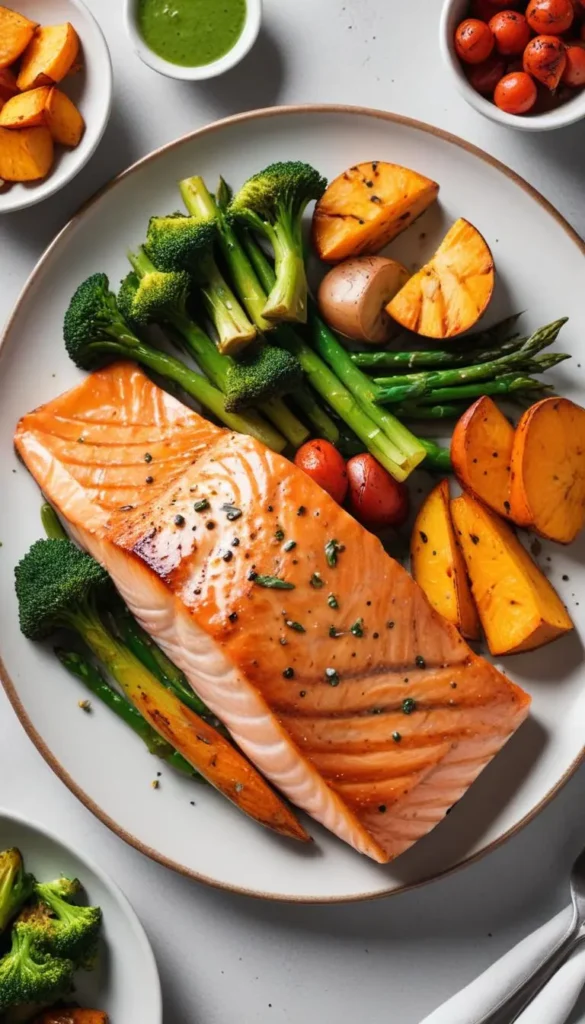
Breakfast:
- Chia Pudding: Prepare chia pudding the night before with almond milk, chia seeds, and a drizzle of honey. Let it sit overnight, and top it with fresh berries in the morning.
- Herbal Tea: A calming cup of herbal tea to start your day.
Lunch:
- Quinoa and Black Bean Salad: Combine cooked quinoa with black beans, corn, diced tomatoes, and cilantro. Dress with lime juice and a little olive oil.
- Apple: Enjoy a crunchy apple for dessert.
Dinner:
- Vegetable Stir-Fry: Stir-fry a mix of colorful vegetables, such as bell peppers, broccoli, and carrots, in olive oil. Add tofu or tempeh for protein.
- Brown Rice: Serve your stir-fry over brown rice for extra fiber.
Snack:
- Carrot sticks with hummus for dipping.
Day 4: Go Mediterranean

Breakfast:
- Greek Yogurt with Walnuts and Honey: Greek yogurt is packed with protein, and walnuts are rich in omega-3s, perfect for lowering cholesterol.
- Black Coffee: A cup of black coffee pairs well with your breakfast.
Lunch:
- Mediterranean Salad: A mix of spinach, olives, cucumbers, tomatoes, and red onions. Top with grilled chicken or chickpeas for protein, and drizzle with olive oil.
- Whole Wheat Pita: Enjoy a piece of whole wheat pita with your salad.
Dinner:
- Grilled Shrimp with Couscous and Roasted Vegetables: Shrimp provides lean protein, while couscous offers fiber. Pair with roasted vegetables for a well-rounded meal.
- Olive Oil Dressing: A light drizzle of olive oil over the veggies adds flavor and healthy fats.
Snack:
- A small handful of pistachios.
Day 5: Boost Fiber and Protein
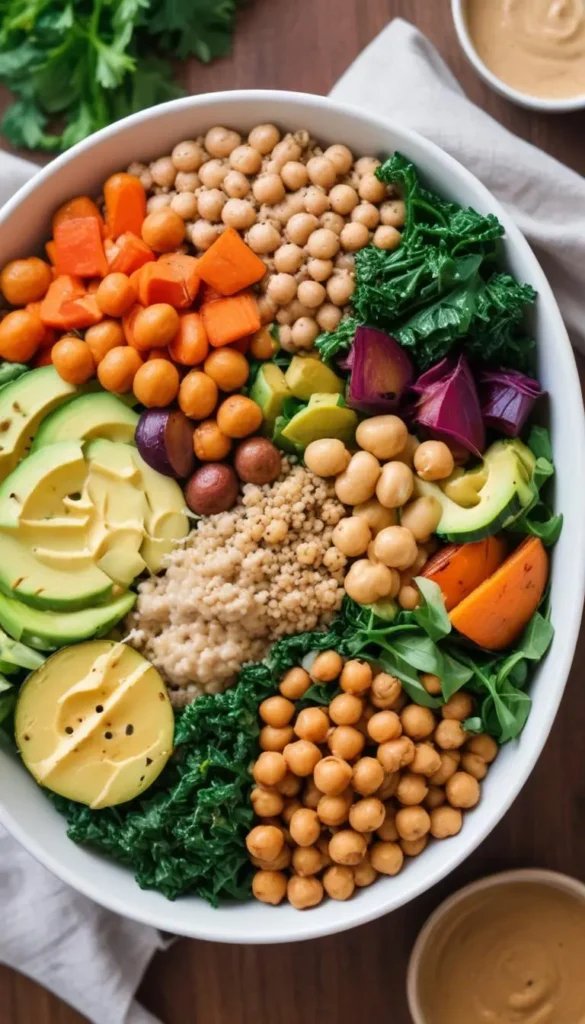
Breakfast:
- Smoothie with Spinach, Banana, and Almond Butter: Blend spinach, a banana, almond butter, and unsweetened almond milk for a nutrient-packed smoothie.
- Green Tea: A cup of green tea to start your day with antioxidants.
Lunch:
- Hummus and Veggie Wrap: Spread hummus on a whole wheat wrap and fill with colorful veggies like cucumbers, bell peppers, and spinach.
- Carrot Sticks: A side of carrot sticks for an extra dose of fiber.
Dinner:
- Baked Chicken with Brown Rice and Steamed Broccoli: Chicken is a lean protein, and brown rice adds fiber. Broccoli provides antioxidants and fiber.
- Olive Oil Drizzle: Drizzle olive oil on your broccoli for a heart-healthy finishing touch.
Snack:
- A small handful of sunflower seeds.
Day 6: Go for Heart-Healthy Fish
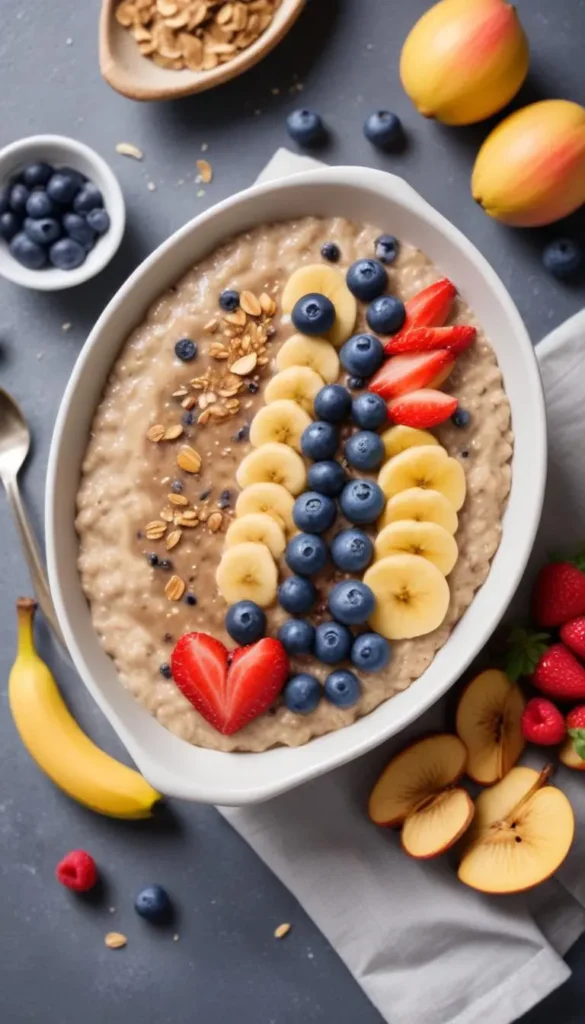
Breakfast:
- Oatmeal with Almond Butter and Banana: Top your oatmeal with a spoonful of almond butter and a sliced banana for added protein and healthy fats.
- Herbal Tea: A cup of herbal tea to hydrate and refresh.
Lunch:
- Tuna Salad on Whole Wheat Bread: Mix canned tuna (in water) with Greek yogurt, mustard, and chopped veggies. Spread it on whole wheat bread for a filling lunch.
- Side of Fruit: A side of sliced strawberries or apple slices.
Dinner:
- Grilled Salmon with Spinach and Quinoa: Salmon provides omega-3s, spinach is rich in fiber, and quinoa adds protein. A heart-healthy dinner all around!
- Olive Oil Dressing: Dress the spinach with olive oil for extra healthy fats.
Snack:
- A small handful of walnuts.
Day 7: Finish the Week Strong

Breakfast:
- Smoothie with Kale, Mango, and Flaxseeds: A smoothie made with kale, mango, and flaxseeds is rich in fiber and antioxidants to boost heart health.
- Black Coffee: A simple cup of black coffee to keep you energized.
Lunch:
- Chickpea Salad: Combine chickpeas with cucumbers, red onions, tomatoes, and olive oil dressing for a protein-packed, cholesterol-lowering lunch.
- Side of Whole Wheat Crackers: A handful of whole wheat crackers for a crunchy side.
Dinner:
- Baked Cod with Sweet Potato and Steamed Green Beans: Cod is a lean, heart-healthy fish. Pair it with sweet potatoes and green beans for a well-balanced, cholesterol-friendly dinner.
- Olive Oil Drizzle: Drizzle olive oil on your green beans for added flavor and healthy fats.
Snack:
- A handful of mixed nuts.
Drinks That Help Lower Cholesterol
What you drink is just as important as what you eat. Here are some drinks that can help lower cholesterol:
- Green Tea: Rich in antioxidants, green tea can help lower LDL cholesterol.
- Water: Staying hydrated is key for overall health and can support healthy cholesterol levels.
- Herbal Teas: Herbal teas like ginger or turmeric tea are anti-inflammatory and heart-healthy.
- Fresh-Squeezed Juices: Fresh juices made from fruits like oranges, lemons, and pomegranates are packed with antioxidants and can support heart health.
Final Thoughts on the 7-Day Cholesterol-Lowering Meal Plan
This 7-day meal plan is a great way to get started on your journey toward lowering cholesterol and improving your heart health. By incorporating heart-healthy foods like fruits, vegetables, whole grains, and healthy fats, you can make a real difference in your cholesterol levels. Plus, these meals are delicious and easy to prepare, making it easier for you to stick to the plan.
Remember, this is just the beginning. As you continue on your journey to better heart health, consider working with a dietitian to create a plan that works best for you. And don’t forget to stay active, as exercise is another key factor in managing cholesterol levels.
Are you ready to take control of your heart health? Let’s get started!

Lifebing is driven by an unrelenting passion for promoting health and well-being, our team is wholly committed to curating exceptional content and immersive experiences.
